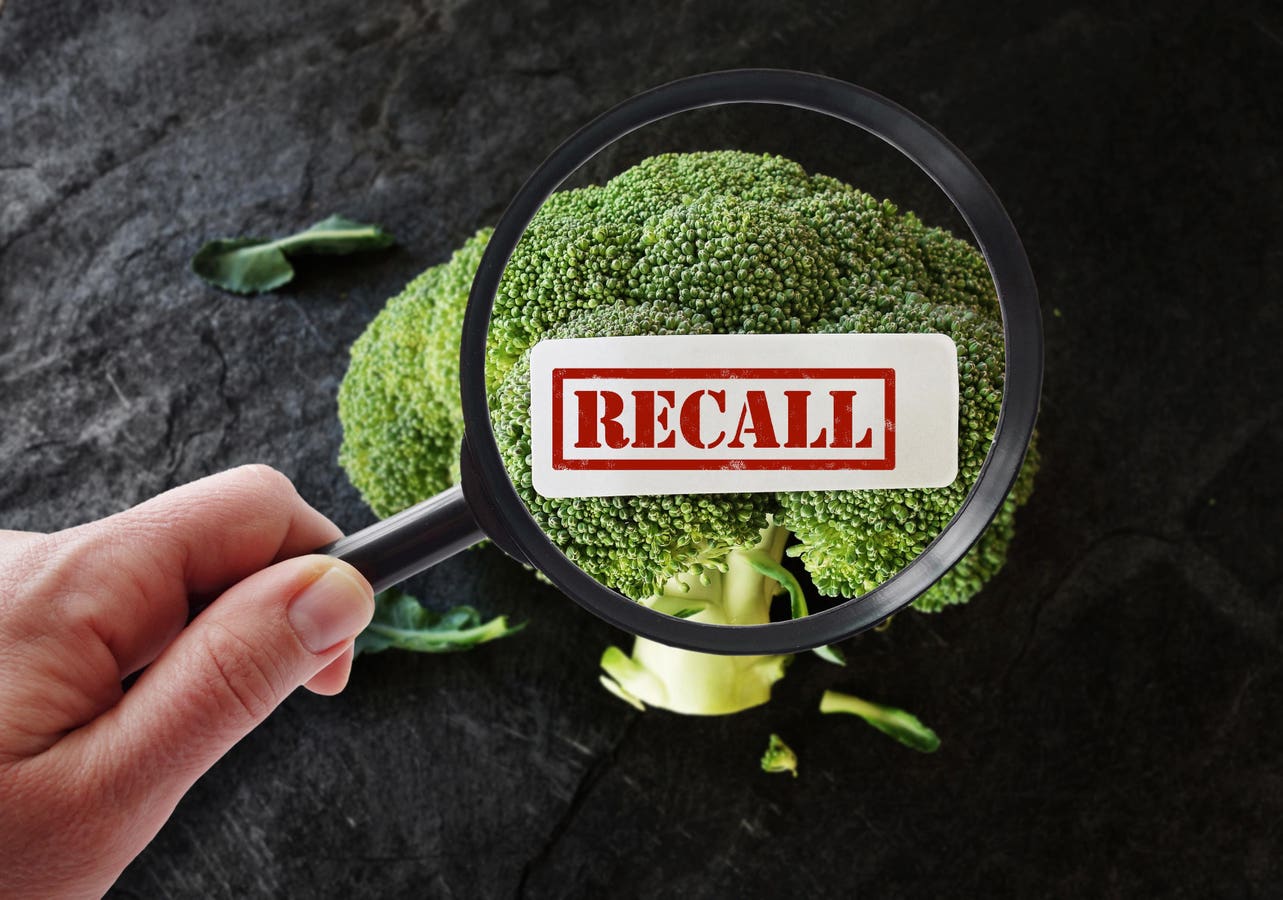Food recalls often start as minor advisories—but some become public health emergencies overnight.
That’s exactly what happened with Walmart’s Marketside Broccoli Florets. What began as a routine advisory quickly escalated to a Class 1 recall, the FDA’s most serious classification, reserved for food safety threats that can cause severe illness or death.
And it isn’t alone—multiple food recalls this year have followed the same pattern.
So, what triggers a Class 1 recall? And why do some recalls start small before being reclassified? Let’s break it down—plus, we’ll look at five other Class 1 food recalls that were upgraded, why it happened, and how to tell caution from hype.
How the FDA Classifies Recalls
Not all recalls are created equal. The FDA assigns one of three classifications based on the level of risk to public health:
- Class I – The most serious level. This means there’s a reasonable probability that consuming the product could cause severe illness or death (e.g., food contaminated with Listeria, Salmonella, or undeclared major allergens).
- Class II – A recall where the product might cause temporary or medically reversible health issues but is less likely to be life-threatening (e.g., small amounts of contaminants, mislabeled ingredients without major allergens).
- Class III – The least serious level. This applies to products that violate regulations but aren’t expected to cause health problems (e.g., minor packaging errors, incorrect weight labels).
Many Class 1 recalls don’t start at that level. Instead, they begin as Class 2 recalls before being upgraded due to new test results, consumer illnesses, or expanded distribution.
Why Do Some Recalls Start Small and Get Upgraded?
Some recalls start as lower-risk warnings but get upgraded when new information emerges, such as:
- Further testing reveals contamination is more widespread than initially thought.
- Consumer illness reports confirm that the food has made people sick.
- Cross-contamination is found in multiple production batches.
- Expanded distribution means the product was sold in more stores and more states than first reported.
This is why some recalls seem to escalate out of nowhere—they don’t start at Class 1, but the risks become clearer over time.
Frito-Lay Potato Chips Recall—Undeclared Milk Allergens
For people with severe dairy allergies, a mislabeled chip isn’t just an inconvenience—it’s a hidden danger.
Why It Was Upgraded to Class 1: Initially, the Lay’s potato chips recall was a Class 2 warning due to a labeling issue. However, further testing confirmed widespread cross-contamination with milk allergens. Since consuming these chips could cause life-threatening anaphylactic shock, the FDA upgraded the recall to Class 1.
What Happened? Due to a manufacturing error, Certain Lay’s potato chips mistakenly contained milk-based ingredients. Because allergic reactions can happen even with trace amounts of dairy, the recall became an urgent public health risk.
Read More: Why Lay’s Potato Chip Recall Was Elevated to FDA’s Deadliest Category
Walmart’s Marketside Broccoli Recall—Listeria Contamination
Listeria isn’t just another foodborne illness—it’s one of the deadliest.
Why It Was Upgraded to Class 1: The broccoli recall began as a precautionary advisory but was escalated to Class 1 when additional testing revealed widespread contamination. Listeria can survive refrigeration, making it especially dangerous in raw produce like bagged vegetables.
What Happened? Walmart pulled 12oz Marketside Broccoli Florets from stores across 20 states after FDA tests confirmed Listeria monocytogenes. Since Listeria poses a high risk to pregnant women, newborns, and older adults, the recall was upgraded. While the product is no longer in stores, some consumers may still have it in their freezers.
Read More: Walmart Broccoli Recall Elevated To FDA’s Deadliest Category
Costco Egg Recall—Salmonella Risk in Organic Eggs
Eggs are one of the most recalled grocery staples, and salmonella contamination makes this recall particularly serious.
Why It Was Upgraded to Class 1: The initial recall was limited in scope, but as new test results emerged, the FDA raised it to Class 1.
What Happened? Costco’s Kirkland Signature Organic Pasture-Raised 24-count Eggs were recalled due to potential salmonella contamination. FDA officials escalated the recall when additional test batches showed higher contamination levels when they learned that the product had been distributed in five states, increasing consumer risk.
Read More: FDA Raises Recall on Costco Eggs
Wicklow Gold Cheddar Recall—Listeria Risk in Soft Cheese
Soft cheeses have been at the center of deadly Listeria outbreaks before.
Why It Was Upgraded to Class 1: When Wicklow Gold Cheddar Tomato & Herb tested positive, the FDA moved fast to prevent a larger outbreak.
What Happened? Abbey Specialty Foods issued a Class 1 recall for certain 5.2-ounce packages of Wicklow Gold Cheddar in Maassachusetts, Maine, New Hampshire, Ohio, and Colorado.
Cal Yee Farm Snacks Recall—Undeclared Allergens
Undeclared allergens are one of the leading causes of Class 1 recalls, as consuming them can lead to severe, life-threatening allergic reactions.
Why It Was Upgraded to Class 1: The recall was initially issued for various snack products but was later expanded, with the FDA classifying it as a Class 1 recall in its Jan. 29 Enforcement Report.
What Happened? Cal Yee Farm LLC issued a recall for multiple snack products due to undeclared milk, soy, wheat, sesame, FD&C #6, and almonds. The recall was expanded to include dark chocolate walnuts, dark chocolate almonds, and dark chocolate apricots, prompting the FDA to reclassify the recall of those items due to the severity of potential health risks.
What Class 1 Recalls Reveal About Food Safety
These recalls tell a bigger story:
- Food safety isn’t static—what starts as a small advisory can escalate into a nationwide recall.
- Regulators don’t always catch risks immediately—some recalls only happen after consumers get sick.
- Even “organic” or “premium” products aren’t immune—Costco’s organic eggs and chocolate were both impacted.
While FDA recalls help protect public health, staying informed is the best way to avoid potentially dangerous foods before they’re pulled from shelves.
MORE FROM FORBES
Read the full article here





